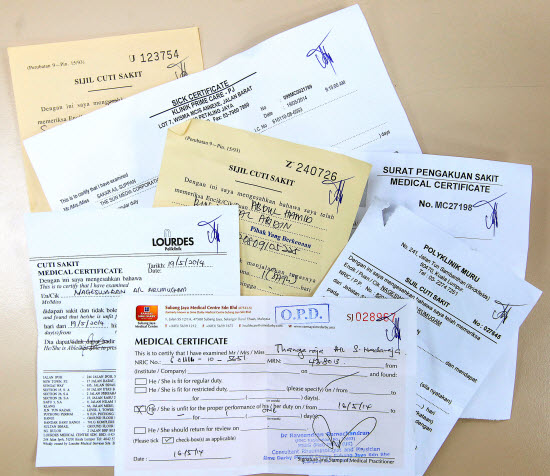Can Your Employer Fire You If You Don't Submit An MC?
All employees are entitled to sick leave.
Getting fired or terminated from a job is a very serious matter.
Employers may choose to dismiss a worker for various reasons, but can an employee be fired for taking sick leave?
Sick leave is an entitlement to begin with. Employees covered under the Employment Act 1955, which only applies to Peninsular Malaysia and Labuan, are entitled to a minimum number of sick leaves, in accordance to their length of service with the company:
1. Less than 2 years of service - 14 days
2. Two years, but less than five years of service - 18 days
3. More than 5 years of service - 22 days
In the event that hospitalisation is required, employees are entitled to 60 days of hospitalisation leave per year, provided that the number of sick leave and hospitalisation leave per year shall not exceed 60 days in total.
Not all employees are covered by the Employment Act. Those who are protected include employees whose monthly wages are less than RM2,000 and those who are engaged in a certain occupation (as specified in the Employment Act) if their salary is above RM2,000.
Those who are not covered are normally governed as per the agreed terms and conditions that are stated in their contract of employment or company policy, which usually uses the Employment Act as a guideline.
While the Employment Act provides statutory benefits for employees, it also outlines employees' obligations to hold them responsible in their work
Based on Section 60F(2) of the Employment Act:
(2) An employee who absents himself on sick leave—
(a) which is not certified by a registered medical practitioner or a medical officer as provided under subsection (1) or a dental surgeon as provided under subsection (1A); or
(b) which is certified by such registered medical practitioner or medical officer or dental surgeon, but without informing or attempting to inform his employer of such sick leave within forty-eight hours of the commencement,
thereof, shall be deemed to absent himself from work without the permission of his employer and without.
In simple terms, employees will be deemed absent from work without permission of their employers if they claim to be on sick leave but do not have proof (such as medical certificates or MCs) to substantiate the reason for absence, or fail to inform their employer about their absence within 48 hours.
Unauthorised absence from work can be considered as a misconduct, which could justify termination of employment.
In fact, as per the Employment Act Section 15(2), if an employee has been continuously absent for two consecutive working days without prior leave and failed to serve proper notice or attempt to inform his employer prior to or at the earliest opportunity during such absence, then the employee would be considered to have committed an act of breach of contract.
What can employers do when employees abuse sick leave?
Employees feigning illnesses to get sick leave or MCs is not unheard of. Some even buy fake MCs just to get a day off or two. However, there are serious repercussions to this, especially when it is an offence in the eyes of the law.
In April 2017, a teacher and a clerk were charged under Section 420 of the Penal Code, which carries a maximum of 10 years' jail term, whipping and a fine upon conviction, for cheating a school by submitting fake MCs.
If an employer suspects possible misconduct by an employee, some of the best practices to handle such cases include conducting "due inquiry" such as issuing a show cause letter or notice of Domestic Inquiry (DI), before dismissing the employee or imposing any other disciplinary actions or penalties.
This is because if an employer terminates an employee without taking appropriate steps and precautions before making that decision, it could be unfavourable for the employer if the affected employee files for an unfair dismissal.
This brings us to the next point: If an employee was dismissed without a justified reason or excuse, then he or she can make claims for unfair dismissal or unlawful termination.
Section 20 of the Industrial Relations Act 1967 provides for employees to seek to be reinstated if they were dismissed without just cause or excuse by their former employer.
The general understanding is that any employee, irrespective of wages and type of occupation, can file a complaint to the Department of Industrial Relations Malaysia (JPP), which is under the Ministry of Human Resources (MOHR).
According to the information found on the JPP website, a conciliation meeting would be arranged for the employer and employee to reach an amicable settlement. The dispute would then be escalated to the Minister of Human Resources, who would exercise his discretion to decide if the case should be referred to the Industrial Court for a hearing if there is no settlement.
More information on this can be found on the Malaysian Bar website.
Aggrieved parties may also seek assistance on employment disputes from the Manpower Department (JTM), the Department of Labour (JTKSM), and the Malaysian Trade Union Congress (MTUC), among others.

